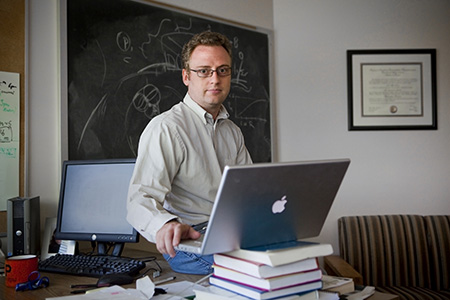
A Binghamton University faculty member has received a prestigious award that no other BU faculty member has ever received: the Presidential Early Career Award for Scientists and Engineers (PECASE).
According to a SUNY press release, the PECASE is the most honorable award given by the federal government to scientists and engineers early in their research careers. BU’s Scott Craver, assistant professor of electrical and computer engineering, was one of 100 scientists and engineers across America to win the award.
“This honor places Professor Craver in the company of the best scientists and engineers in the nation,” said Binghamton University President Lois DeFleur. “His research, teaching and his work with students are outstanding.”
The PECASE awards were established by former President Bill Clinton in 1996 and have two criteria: the winners have to demonstrate a pursuit of innovative research in science and technology and have a commitment to community service, according to the press release.
“The quality of teaching and level of research of our faculty is outstanding and awards like PECASE recognize the excellent work being done at Binghamton University,” said Krishnaswami Srihari, dean of the Thomas J. Watson School of Engineering and Applied Science.
Although Craver is the first BU faculty recipient of the PECASE award, he explained that the Watson School has numerous faculty members who have won a similar honor for early-career scientists and engineers, the National Science Foundation’s CAREER award.
“I chose to come to Binghamton precisely because of the EECE department’s existing reputation for research in my area,” Craver said. “I hope this award helps to shine just one more spotlight on Binghamton’s impressive track record of research”.
Craver explained that the award is based on his ongoing research in information hiding. The research projects that won him the award started in 2005.
More recently, Craver and his team have been focusing on reverse-engineering and eliminating detection algorithms.
“Our new research program will extend and unify our existing research into a general theory of reverse-engineering,” he said.
According to Craver, finding and destroying watermarks has been a “springboard” into other areas of information security.
Craver will receive a grant of 200,000 dollars a year for five years due to his award. He said this will allow a few graduate students to “pursue a unified theory of counter deception.”
The PECASE is given out in the fall at the White House. Craver is expecting to meet President Barack Obama and get a photo with him.


